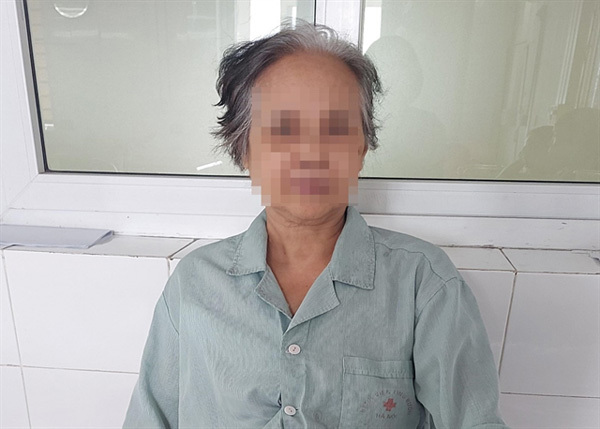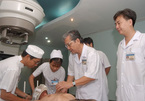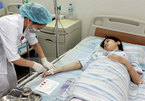 |
| Patient D.T.T. after surgery to remove a tumour from her right breast at the Hanoi Oncology Hospital. — Photo courtesy of the Hanoi Oncology Hospital |
The patient, named D.T.T., living in Hoang Mai District, Hanoi, came to the hospital when her right breast was swollen with sores, bleeding and a foul-smelling discharge.
She said that the tumour appeared about 20 years ago and was small to start with. As the tumour grew, she treated herself by following traditional cures like drinking animal bile, tiger bone glue and black musk, but the tumour kept growing. Her right breast had bruises, sores and even occasional bleeding over the last five years.
She was diagnosed with breast cancer. If not treated early, the tumour would continue to grow and metastasise to other organs, threatening her life, according to the doctors.
Because the tumour was too big, invading a part of her breast muscle, the hospital’s surgical team had to remove her entire right mammary gland, including the tumour and armpit node, while rotating her abdominal flap to replace the defective chest wall. Three days after surgery, the patient had almost completely recovered. The incision was dry and she was given additional radiation treatment.
Dr. Vu Kien, the hospital deputy director who performed the surgery, said that such cases may initially be just a benign tumour. However, it would turn malignant if the patient does not receive quick treatment.
“Having abnormal signs in the mammary glands on both sides and underarms such as: breast pain, pain in the armpits, nipple discharge, abnormal breasts, lumps in the mammary glands, changes in the skin of the breast, receding nipples, changes in the skin around the nipples, underarm lymph nodes, patients should visit an oncologist for diagnosis and treatment,” said Dr. Kien.
He also advises women, especially those over 40 years of age, to actively screen for breast cancer even when they have no symptoms, in order to detect cancer at an early stage. Early diagnosis of breast cancer increases the chance of successful treatment, reducing complications. On the contrary, delaying detection will make treatment complicated, costly and lead to disability and low chances of survival.
In Vietnam, breast cancer is the most common cancer among women with the age-standardised incidence rate (ASR) in 2013 of 24.4 per 100,000 (GLOBOCAN estimate for 2018 is 26.4 per 100,000 people). VNS

Cancer professor travels far to help patients
Professor Nguyen Chan Hung, one of Vietnam’s leading oncology experts, has been retired for almost 20 years. At the age of 75, he is still passionate about his work.

Thousands of cancer patients concerns over drug shortage
Over the past three years, N T H, a 38-year-old woman from the Mekong Delta province of An Giang, has visited the National Institute of Hematology and Blood Transfusion for chronic myeloid leukaemia treatment.
 Doctors from the Hanoi Oncology Hospital have successfully removed a "huge" breast cancer tumour measuring up to 15cm in diameter, saving the life of a 73-year-old woman in Hanoi.
Doctors from the Hanoi Oncology Hospital have successfully removed a "huge" breast cancer tumour measuring up to 15cm in diameter, saving the life of a 73-year-old woman in Hanoi.